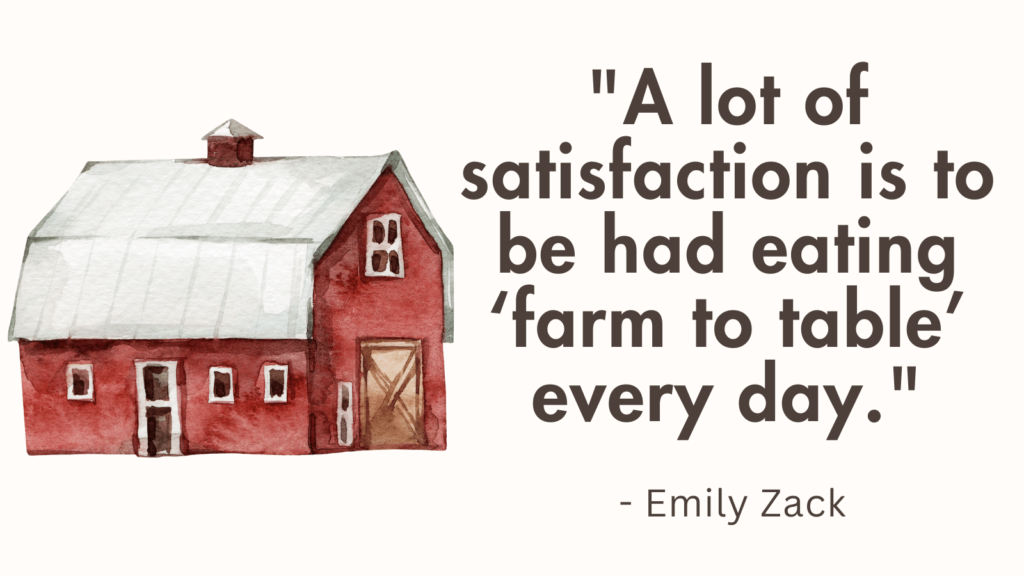Can goats eat tomatoes? Read on to find out.
Can Goats Eat Tomatoes?
Yes, goats can eat tomatoes, but it’s important to feed them in moderation and with caution.
While tomatoes are not toxic to goats, there are a few considerations to keep in mind:
1. Ripe tomatoes are generally safe
Ripe tomatoes are safe for goats to consume in small quantities as part of a balanced diet.
However, unripe or green tomatoes contain solanine, a toxic substance that can be harmful to goats if ingested in large amounts.
Therefore, it’s best to stick to ripe tomatoes.
2. Remove stems and leaves
Before feeding tomatoes to goats, it’s essential to remove any stems or leaves.
These parts of the tomato plant, like the green unripe fruit, can contain higher levels of solanine, which can be toxic to goats.
Related: Can Goats Eat Watermelon?
3. Variety matters
Some varieties of tomatoes may be more acidic or have a higher sugar content than others.
While small amounts of these varieties may be fine, excessive consumption might lead to digestive issues or upset stomachs in some goats.
Monitor your goat’s reaction to tomatoes and adjust accordingly.
4. Balanced diet is key
Tomatoes should be given as a treat or supplement to a well-balanced diet that primarily consists of hay, grass, and appropriate goat feed.
Goats require a diet rich in fiber, and tomatoes should not replace the necessary nutrients provided by their regular feed.
Related: Will Chickens Stop Laying If Coop Is Dirty? [Raising Chickens Complete Guide]
5. Quantity and moderation
It’s important to offer tomatoes in moderation, especially initially, to assess how your goats respond to them.
Start with small amounts and monitor their digestion, as some goats may be more sensitive to new foods than others.
6. Variety in the diet
While goats can eat tomatoes, it’s crucial to provide a diverse range of foods to ensure they receive all the necessary nutrients.
Feeding too many tomatoes or relying solely on them may create an imbalance in their diet.
7. Avoid rotten or spoiled tomatoes
Only offer fresh, ripe tomatoes to your goats.
Rotten or spoiled tomatoes can cause digestive upset or other health issues if consumed.
Remember, each goat is unique, and their preferences and tolerances may vary.
Always observe your goats closely when introducing new foods and consult with a veterinarian or a qualified animal nutritionist to ensure their dietary needs are appropriately met.
Related: How To Keep Chickens Out Of Garden?
How to Raise Goats?
Raising goats can be a rewarding experience whether you’re doing it for milk, meat, fiber, or simply as a hobby.
Here are some guidelines to help you get started on successfully raising and caring for goats.
1. Research and Choose the Right Breed
Before getting goats, it’s important to research different goat breeds and choose the one that aligns with your goals and resources.
Consider factors like climate adaptability, milk/meat production, temperament, and space requirements.
Popular dairy goat breeds include Saanen, Alpine, and Nubian, while Boer and Kiko are known for meat production.
2. Provide Adequate Shelter
Goats require shelter to protect them from extreme weather conditions, predators, and provide a safe place for kidding (giving birth).
The shelter should be well-ventilated and spacious enough to accommodate all goats comfortably.
It’s also essential to have separate areas for sleeping, feeding, and kidding if necessary.
Related: Does Clover Grow In Shade?
3. Ensure Proper Fencing
Fencing is crucial to keep goats contained and safe.
Use sturdy fencing materials like woven wire or electric fencing, ensuring it is at least 4 to 5 feet tall to prevent escape.
Regularly check the fence for any damages or weaknesses to maintain the security of your goats.
4. Provide Ample Grazing Area
Goats are natural grazers and prefer to browse on a variety of plants.
Providing them with enough pasture or browsing area is essential for their overall health.
Rotate grazing areas regularly to prevent overgrazing and allow pastures to regenerate.
Related: How to Protect Your Watermelon Farm?
5. Feed a Balanced Diet
In addition to grazing, goats need a balanced diet consisting of hay, grains, and minerals.
Provide good quality hay, such as Timothy or alfalfa, as the main forage source. Introduce grains gradually to prevent digestive issues.
Consult a nutritionist for specific dietary recommendations based on breed, age, and purpose of raising your goats.
6. Ensure Fresh Water Supply
Access to clean, fresh water is critical for goats’ well-being.
Provide water in clean containers that are easily accessible, especially during hot weather or when goats are lactating.
Ensure the water source is protected from contamination and regularly check for cleanliness.
Related: How to Grow Winter Peas?
7. Establish a Routine Veterinary Care
Maintaining good health in goats includes regular veterinary care.
Schedule routine vaccinations, deworming, and annual check-ups.
Consult with a reputable veterinarian to develop a health plan tailored to your goat’s needs and follow it consistently.
Additionally, keep a record of veterinary treatments and any health issues for future reference.
8. Practice Good Hoof Care
Regular hoof trimming is essential for goat health.
Overgrown hooves can lead to discomfort, lameness, and other foot-related issues.
Learn how to trim hooves properly or hire a professional to do it for you.
Provide a clean, dry area for goats to stand and minimize the risk of hoof problems.
Related: How To Start Farming With No Money?
9. Monitor Reproduction
If breeding goats, closely monitor their reproductive cycle and behavior.
Keep track of heat cycles, and if desired, introduce a buck for mating.
Prepare a separate kidding area with clean bedding, warmth, and privacy.
Assist the doe during kidding if necessary, but let nature take its course.
10. Socialize and Provide Enrichment
Goats are social animals and thrive in herds.
It’s recommended to have at least two goats to prevent loneliness and ensure a higher quality of life.
Spend time with your goats regularly, provide mental stimulation, and offer enrichment activities like toys or access to structures for climbing.
Related: What’s The Difference Between A Farm And A Ranch?
11. Maintain Cleanliness and Hygiene
Cleanliness is crucial in managing goats.
Regularly clean their living area, remove feces, and provide fresh bedding.
This helps prevent the spread of diseases and parasites.
Keep feed and water containers clean to avoid contamination.
12. Educate Yourself and Seek Support
Continuously educate yourself about goat husbandry.
Connect with experienced goat owners.
Networking with others can provide valuable advice and support when challenges arise.
Related: Does Contour Farming Work Everywhere?
Conclusion
Raising goats requires commitment, continuous learning, and dedication.
Each goat is unique, so observing their behavior, health, and individual needs is essential for their well-being.
FAQ
What kind of housing do goats need?
Goats require a well-ventilated and secure shelter to protect them from extreme weather conditions and predators.
The shelter should provide sufficient space for all goats, separate sleeping and feeding areas, and a protected area for kidding.
How often should I trim goat hooves?
Goat hooves should be trimmed regularly, usually every 6-8 weeks.
Overgrown hooves can cause discomfort and lead to hoof-related issues.
Learn proper hoof trimming techniques or hire a professional to do it for you.
Related: Why Do You Plant Rosemary By Your Garden Gate?
How often should I deworm my goats?
Goats should be dewormed regularly, typically every 4-6 weeks or as advised by a veterinarian.
Deworming helps control internal parasites, which can negatively impact goats’ health and productivity.
When and how do I breed my goats?
The breeding time for goats depends on the breed and individual reproductive cycles.
Generally, goats can be bred when they reach sexual maturity, which is around 7-10 months of age.
Introduce a buck (male goat) during the doe’s (female goat) heat cycle for mating. Monitor their behavior and consult with a veterinarian for guidance.
Related: Do Rabbits Eat Mint In The Garden?
Can I raise goats in a suburban or urban setting?
It is possible to raise goats in suburban or urban areas, but local regulations and restrictions may apply.
Check with your local authorities to ensure compliance with zoning laws and any limitations on livestock ownership.
Also, consider the space requirements and potential noise concerns for neighbors.

Garden Cart
*As an Amazon Associate I earn from qualifying purchases, at zero cost to you, if you click through the link and finalize a purchase.




